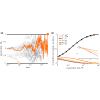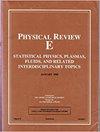快速决策反映偏见,缓慢决策不反映偏见
IF 2.4
3区 物理与天体物理
Q1 Mathematics
引用次数: 0
摘要
决策通常是由异质群体做出的,每个人都有不同的初始偏见,获得的信息质量也不尽相同。我们的研究表明,在积累证据的独立代理人群体中,最先做出决定的是那些初始偏见最强的人。无论真相如何,他们的决定都与他们的初始偏见一致。与此相反,最后做出决定的代理在做出决定时就好像他们最初是没有偏见的,因此会做出更好的选择。我们得到了大群体极限的渐进表达式,量化了代理人的初始倾向如何影响早期决策。我们的分析表明,偏差、信息质量和决策顺序是如何以非对称的方式相互作用,从而决定群体决策的可靠性。本文章由计算机程序翻译,如有差异,请以英文原文为准。

Fast decisions reflect biases; slow decisions do not
Decisions are often made by heterogeneous groups of individuals, each with distinct initial biases and access to information of different quality. We show that in groups of independent agents who accumulate evidence the first to decide are those with the strongest initial biases. Their decisions align with their initial bias, regardless of the underlying truth. In contrast, agents who decide last make decisions as if they were initially unbiased and hence make better choices. We obtain asymptotic expressions in the large population limit quantifying how agents' initial inclinations shape early decisions. Our analysis shows how bias, information quality, and decision order interact in nontrivial ways to determine the reliability of decisions in a group.
求助全文
通过发布文献求助,成功后即可免费获取论文全文。
去求助
来源期刊

Physical review. E
物理-物理:流体与等离子体
CiteScore
4.60
自引率
16.70%
发文量
0
审稿时长
3.3 months
期刊介绍:
Physical Review E (PRE), broad and interdisciplinary in scope, focuses on collective phenomena of many-body systems, with statistical physics and nonlinear dynamics as the central themes of the journal. Physical Review E publishes recent developments in biological and soft matter physics including granular materials, colloids, complex fluids, liquid crystals, and polymers. The journal covers fluid dynamics and plasma physics and includes sections on computational and interdisciplinary physics, for example, complex networks.
 求助内容:
求助内容: 应助结果提醒方式:
应助结果提醒方式:


